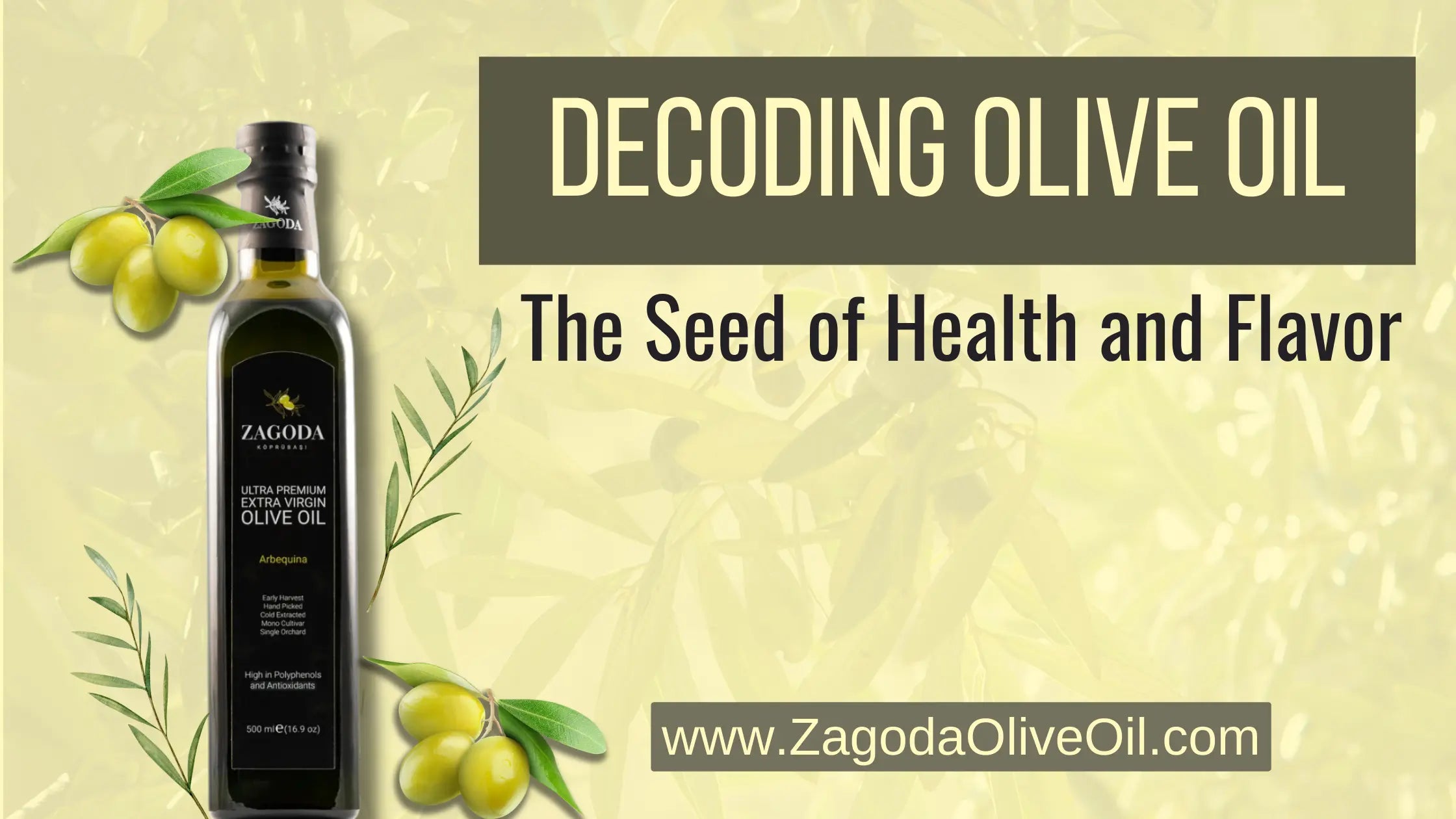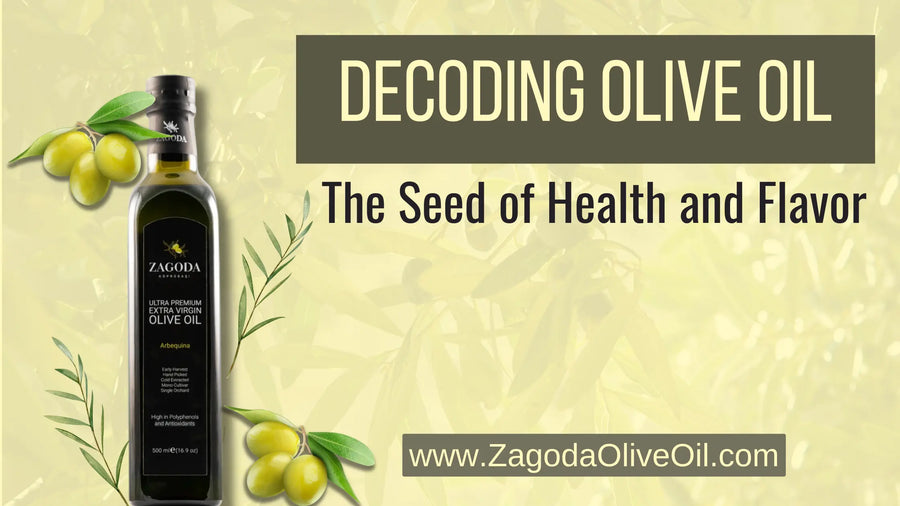When it comes to cooking oils, there are countless options to choose from. One category of oils that has gained significant popularity in recent years is seed oils.
But what exactly are seed oils?
In simple terms, seed oils are extracted from the seeds of plants. They are rich in essential fatty acids, vitamins, and minerals, making them a valuable addition to any diet.
In this ultimate guide, we will explore the world of seed oils, their health benefits, and why olive oil reigns supreme in terms of both health and flavor. Take the first step towards a tastier, healthier lifestyle today. Choose quality, choose excellence, choose Zagoda Olive Oil.
Understanding the Health Benefits of Seed Oils
Seed oils offer a wide range of health benefits. They are known to reduce inflammation, support heart health, improve brain function, and promote healthy skin.
Additionally, they provide a valuable source of antioxidants, which help protect our cells from free radicals and oxidative stress.
It's important to note that not all seed oils are created equal. Some are more nutritious and beneficial than others. So, let's dive deeper into the world of seed oils and explore which ones are worth incorporating into your diet.
The Debate: Does Olive Oil Count as a Seed Oil?
One common question that arises when discussing seed oils is whether olive oil falls into this category. The answer is yes. Despite its name, olive oil is indeed a seed oil. Olive oil is derived from the seeds of olives, which are technically classified as fruits.
However, due to its unique flavor profile and exceptional health benefits, olive oil often stands apart from other seed oils. It is renowned for its high content of monounsaturated fats, which are heart-healthy and help reduce the risk of cardiovascular diseases. Olive oil is also a great source of antioxidants, vitamin E, and other beneficial compounds.
Not All Oils Are Created Equal: Which Oils Are Not Seed Oils?
While seed oils offer numerous health benefits, it's important to note that not all oils fall into this category. Some popular cooking oils, such as coconut oil and palm oil, are not derived from seeds but rather from the fruits or nuts of their respective plants.
Coconut oil, for example, is extracted from the meat of coconuts, while palm oil is derived from the fruit of oil palm trees. These oils have their own unique properties and uses, but for the purpose of this guide, we will focus specifically on seed oils.
Exploring the Different Types of Seed Oils
Now that we have established what seed oils are, let's explore the different types that are available. Some common seed oils include sunflower oil, sesame oil, canola oil, flaxseed oil, and grapeseed oil.
Each of these oils has its own distinct flavor profile, smoke point, and nutritional composition. Sunflower oil, for example, is rich in vitamin E and has a mild flavor, making it suitable for a variety of cooking methods. On the other hand, sesame oil has a strong, nutty taste and is often used in Asian cuisine for its distinct flavor.
The Healthiest Oil to Cook With: Why Olive Oil Takes the Crown
When it comes to cooking oils, olive oil is often hailed as the healthiest option. Not only does it offer numerous health benefits, but it also adds a delicious flavor to your dishes. Olive oil is primarily composed of monounsaturated fats, which are considered heart-healthy and help lower bad cholesterol levels.
It is also a good source of vitamin E and antioxidants, which have been linked to a reduced risk of chronic diseases. Furthermore, olive oil has a high smoke point, making it suitable for various cooking methods, including sautéing, roasting, and even deep-frying.
Exploring the Health Benefits of Olive Oil
Olive oil has been a staple in Mediterranean cuisine for centuries, and for good reason. Numerous studies have shown that a diet rich in olive oil is associated with a lower risk of heart disease, stroke, and certain types of cancer.
Olive oil's high content of monounsaturated fats helps reduce inflammation in the body and improve blood vessel function. It is also known to have a positive impact on brain health and may help protect against age-related cognitive decline. Additionally, olive oil has been shown to promote healthy skin and hair, thanks to its moisturizing and antioxidant properties.
Avocado Oil vs. Olive Oil: Which Is Better for You?
Avocado oil has gained popularity in recent years for its health benefits and versatility in cooking. Like olive oil, avocado oil is rich in monounsaturated fats, which are beneficial for heart health. Both oils also contain antioxidants and vitamin E.
However, there are some key differences between the two. Avocado oil has a higher smoke point than olive oil, making it better suited for high-heat cooking methods. On the other hand, olive oil offers a more distinct flavor profile and a wider range of culinary uses.
Ultimately, the choice between avocado oil and olive oil depends on personal preference and the intended use.
A List of Seed Oils to Avoid
While seed oils offer numerous health benefits, it's important to be aware of certain seed oils that may not be as beneficial for your health. Some examples include cottonseed oil, soybean oil, and corn oil. These oils are often highly processed and may contain unhealthy trans fats and high levels of omega-6 fatty acids.
Consuming excessive amounts of omega-6 fatty acids without a proper balance of omega-3 fatty acids can contribute to inflammation and various health issues. It is best to opt for healthier alternatives like olive oil, avocado oil, and other cold-pressed, unrefined seed oils.
Debunking the Myth: Is Vegetable Oil a Seed Oil?
Vegetable oil is a commonly used cooking oil, but is it a seed oil? The term "vegetable oil" is actually a broad category that encompasses various types of oils. Some vegetable oils, such as soybean oil and corn oil, are indeed derived from seeds.
However, other vegetable oils, like coconut oil and palm oil, are not seed oils. They are extracted from the fruits or nuts of their respective plants. When choosing a vegetable oil, it's best to check the label and opt for oils that are derived from seeds and are minimally processed.
Can Too Much Olive Oil Raise Cholesterol Levels?
Despite its numerous health benefits, there is often a concern that consuming too much olive oil may raise cholesterol levels. However, research has shown that this is not the case.
In fact, the monounsaturated fats found in olive oil can help lower LDL (bad) cholesterol levels and increase HDL (good) cholesterol levels. It's important to note that moderation is key. While olive oil is a healthy addition to your diet, it should still be consumed in moderation as part of a balanced eating plan.
Is Black Seed Oil a Seed Oil?
Black seed oil, also known as black cumin seed oil, is derived from the seeds of Nigella sativa, a plant native to Southwest Asia. While it is commonly referred to as a seed oil, black seed oil is not part of the same category as the seed oils discussed in this guide.
It has its own unique properties and is often used for its potential health benefits, including reducing inflammation, supporting immune function, and promoting healthy hair and skin. However, it is important to note that more research is needed to fully understand the effects of black seed oil on human health.
The Difference Between Seed Oils and Olive Oil
Seed oils and olive oil may both fall under the category of oils derived from seeds, but there are some key differences between the two. Olive oil is extracted specifically from the seeds of olives, while seed oils encompass a wider range of oils extracted from various types of seeds.
Additionally, olive oil has a distinct flavor profile and a higher content of monounsaturated fats compared to many other seed oils. Olive oil also offers a wealth of health benefits that set it apart from its counterparts.
Understanding Extra Virgin Olive Oil: Is It a Seed Oil?
Extra virgin olive oil is often considered the highest quality olive oil available. But is it a seed oil? The answer is yes. Extra virgin olive oil is made from the seeds of olives, just like other types of olive oil.
However, what sets extra virgin olive oil apart is its method of extraction. It is produced by cold pressing the olives, without the use of heat or chemicals, which helps retain its natural flavor and nutritional properties. Extra virgin olive oil is known for its rich, fruity taste and is best enjoyed drizzled over salads, used as a finishing oil, or for dipping bread.
Is Olive Oil Good or Bad for You?
There has been some debate surrounding the health effects of olive oil, particularly in relation to its high fat content. However, the overall consensus among health experts is that olive oil is indeed good for you when consumed in moderation.
The monounsaturated fats found in olive oil have been shown to have numerous health benefits, including reducing the risk of heart disease and inflammation. Additionally, olive oil is a key component of the Mediterranean diet, which has been associated with a lower risk of chronic diseases and overall improved health.
Conclusion: Why Olive Oil Is the Ultimate Choice for Health and Flavor
In conclusion, seed oils offer a wide range of health benefits, but olive oil takes the crown as the ultimate choice for both health and flavor. With its high content of monounsaturated fats, antioxidants, and other beneficial compounds, olive oil has been linked to a reduced risk of various diseases and improved overall well-being.
Its versatility in cooking, distinct flavor profile, and rich history in Mediterranean cuisine make it a staple in many kitchens around the world. So, the next time you reach for a cooking oil, consider opting for olive oil and experience the numerous health benefits and exceptional flavor it has to offer.


